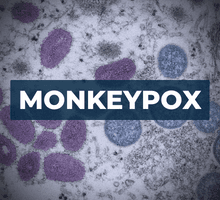With four additional monkeypox cases identified this week, Maricopa County Department of Public Health (MCDPH) continues to administer its limited supply of monkeypox vaccine to those with known or suspected exposure to someone infected with monkeypox in accordance with federal requirements.
Existing vaccine supply can be used for post-exposure protection and pre-exposure protection for a limited number of public health and laboratory workers who are participating in the monkeypox outbreak response. With the current supply limitations, MCDPH is prioritizing administering vaccine to those who are identified as contacts of known monkeypox cases.
“At this time, we have limited quantities of vaccine, which we are prioritizing for people who we know or suspect have been exposed and are within the post-exposure timeframe where that protection can still be effective,” said Marcy Flanagan, executive director for MCDPH. “We are also working with our state and federal partners to secure additional doses so that we are prepared to move into a phase of providing pre-exposure protection to those who are at higher risk. As soon as we have enough vaccine, we will be holding clinics for those at highest risk of being exposed.”
With these plans in place, MCDPH emphasizes that this should not cause concern to the public at large. “Monkeypox is still not common, and it spreads primarily through significant skin-to-skin or intimate contact,” said Dr. Rebecca Sunenshine, medical director for disease control at MCDPH.
Because monkeypox is not a new disease, there is already a vaccine available to prevent disease and reduce spread, as well as treatment for severe illness. Commercial testing has recently become available nationwide, in addition to testing options through state and CDC laboratories.
Monkeypox often starts with a fever, which may be accompanied by:
- Headache
- Muscle aches
- Backache
- Swollen lymph nodes
- Chills
- Exhaustion
One to three days after fever starts, a rash begins, often starting on the face before spreading to other parts of the body. The rash may begin as small, flat, round discolorations that become raised and fluid-filled (clear or pus) before scabbing. These spots and the fluid in them carry virus that can infect others. Once scabs fall off, the area is no longer infectious. These spots or lesions can appear anywhere on the skin, genitals or inside the mouth. Most patients with monkeypox fully recover from the virus without treatment.
The best way to prevent the spread of monkeypox and other viruses is to wash your hands after you touch someone, wear a mask when you are in a crowded indoor space and stay home if you’re sick with fever or respiratory symptoms. Always avoid touching a rash or skin lesions on someone else.
For more information, visit CDC.gov/MonkeyPox.



